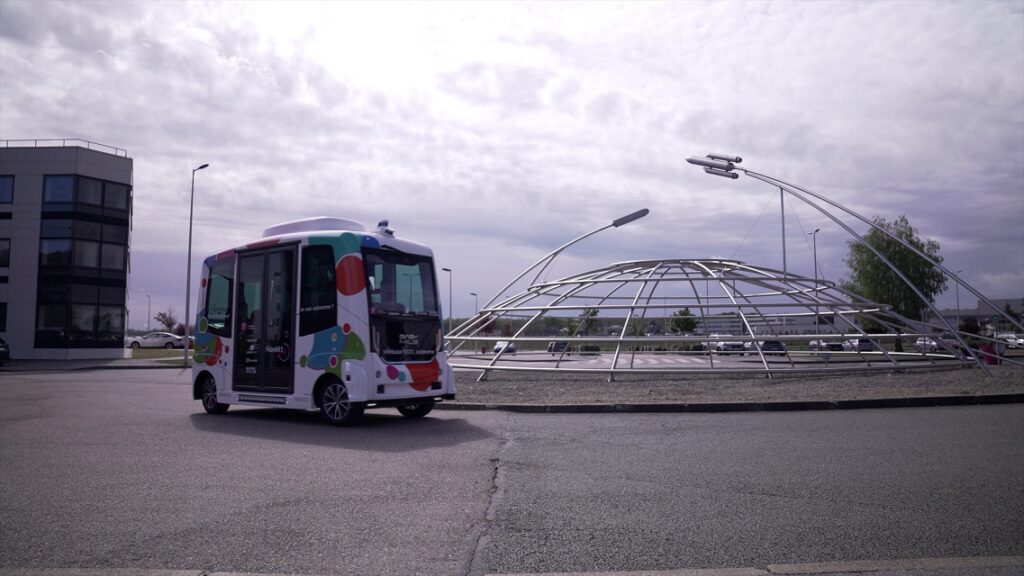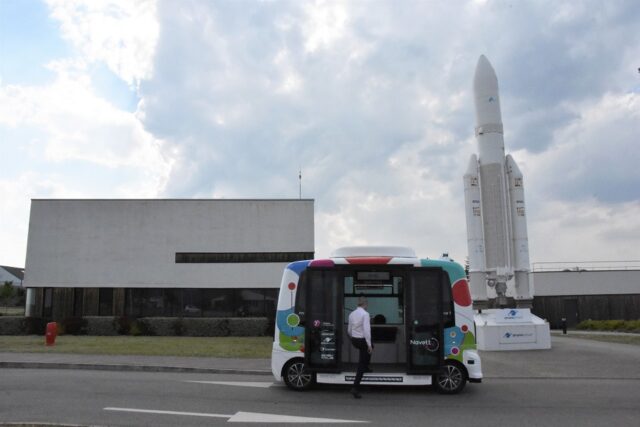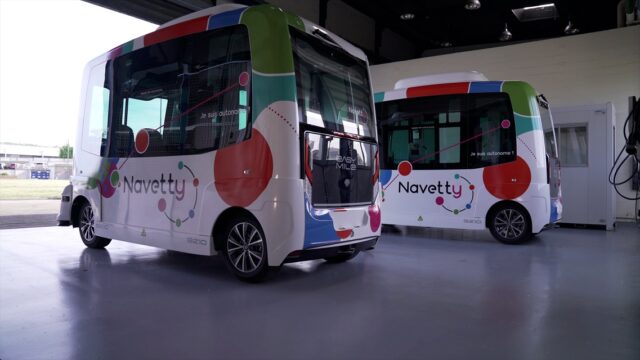The autonomous and electric shuttles of the Navetty research project, supported by the Yvelines Department, EasyMile, Transdev, ArianeGroup and VEDECOM have been running with an on-board supervisor since their official launch in May 2021 at the ArianeGroup site in Les Mureaux, France. In early November, a new step was taken. The shuttles are now running completely autonomously, without a human operator inside the vehicle, marking the first of its kind on a European scale - fully driverless in a complex environment, in normal traffic conditions.
For the Yvelines department, which has invested 2.5 million euros in the project, the Navetty research program aims to promote industrial R&D in the region, but also to ensure the deployment of these innovations on roads open to public traffic.
Press release
Download Navetty press releaseSolving the last mile problem, which many of the region's residents encounter in their daily travels, is also a priority objective, and is fully in line with the strengthening of the region's mobility investment policy. This autonomous shuttle service should eventually provide an optimal connection to the future RER EOLE stations. The department is also continuing to support the strengthening of links between the aeronautical, technological and automotive industries, which are very present in the region.
Maxime Rabasté, Director of Environment and Development at the Yvelines department
The first mobility service without an on-board supervisor is operational in a complex environment in the Yvelines
Two shuttles, developed by EasyMile and operated by Transdev, run daily on routes of up to 6.6 km to enable ArianeGroup employees – up to 10 passengers per trip – to travel around the 92-hectare site, while guaranteeing service quality and safety. Since the launch, more than 50 daily trips have been made, covering 23,000 kilometers in complete safety.
The ArianeGroup site is the ideal launch pad to future deployment on an urban scale. It brings together all the complexities of a city. The shuttles are integrated into a shared environment where pedestrians and vehicles circulate, without modifying existing infrastructures or dedicated lanes. The route integrates traffic circles, intersections, a tunnel and 18 stops spread throughout the site.
We are proud to have a reliable and relevant service for ArianeGroup employees, on such a complex site and in a totally autonomous way. Autonomous shuttles reinforce the attractiveness of public transport, by offering practical and safe collective mobility solutions. Our technology is ready to be deployed on sites of this scale and other sites will soon follow Ariane's example.
Benoit Perrin, General Manager of EasyMile

One remote supervisor for three autonomous shuttles
The autonomous shuttles were deployed progressively over a period of five months, guaranteeing a total level of safety at each stage. A remote supervisor can intervene or interact with passengers at any time from the Central Control Station (CCS), with the possibility of acting when necessary.
The arrival of a third shuttle in January will test the feasibility of supervising a fleet of three autonomous shuttles with a single supervisor, while ensuring safety and service performance.
In addition, it allows planning for the deployment of a permanent commercial service of autonomous shuttles. This is the only project in Europe in which three shuttles will be supervised remotely by one single supervisor, without an on-board operator and under normal traffic conditions.
Through this program, Transdev is preparing to operate the first commercial autonomous shuttle services. From the training of supervisors to the deployment and operation of the service, we are applying our business expertise to achieve the same standards of safety and quality of service as in our fleets of driven vehicles.
Virginie Fernandes, Director of Strategy and Transformation for Transdev Group
Next step: Deploying an on-demand autonomous shuttle service
With the initial technological goals achieved, efforts will focus on developing the service for ArianeGroup employees. A mobile application for on-demand reservations is set to be launched in early 2023. Employees will be able to order a shuttle directly from their location thanks to an integrated geolocation system.
Navetty has been part of the life of our site for a year and a half and is now preparing to go out into the city to eventually extend the service offered to our employees. True to its innovative and pioneering spirit, the ArianeGroup site in Les Mureaux is proud to actively contribute to the development of autonomous urban vehicles.
Hugues Emont, Director of the ArianeGroup site in Les Mureaux

The Navetty project will continue to progress, with the launch in 2023 of a route on an open road between the Mureaux train station and the ArianeGroup site. This will be an opportunity to test the implementation of a “last mile” service and to reflect on the next stages of deployment.
The Navetty program is a concrete illustration of VEDECOM's mission to encourage and federate innovation in the mobility ecosystem, by bringing together territories, manufacturers and transport operators in this European first. As part of this program, VEDECOM will soon be experimenting with two cooperative driving scenarios between infrastructure and vehicles through the implementation of an intelligent traffic circle where disembarked perception followed by a collision risk analysis will make it possible to communicate maneuvering instructions to the shuttles, thus further improving safety and optimizing the time taken to pass through the traffic circle. One more step towards the safe deployment of shared automated vehicle fleets.
Eric Lebeau, VEDECOM's Managing Director


